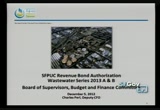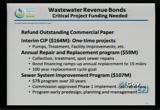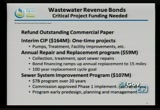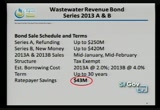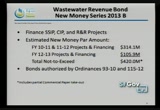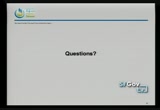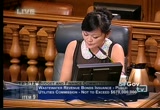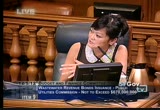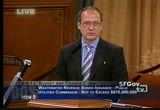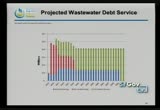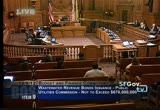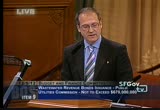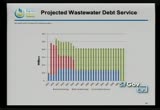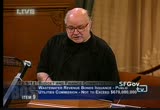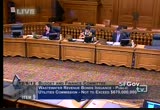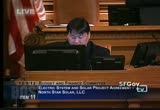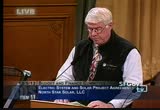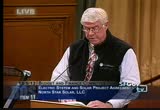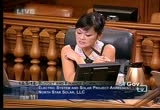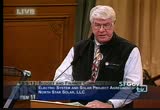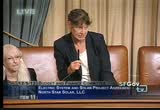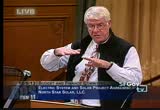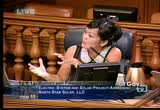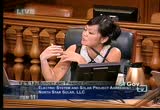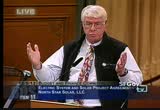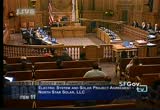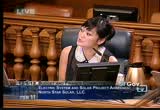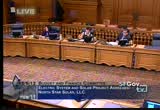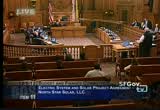tv [untitled] December 5, 2012 12:00pm-12:30pm PST
12:00 pm
to $250 million of bonds to refund our outstanding debt which is primarily our 2003 bonds. we typically have to wait about 10 years before we can refund outstanding debt so this is our first opportunity again to generate savings. i'll talk a little bit more about the details of the savings in a moment. but the other item is the 2013 b bonds. those bonds are expected to be approximately $420 million. the wastewater enterprise was in may of 2010 and we have spent all of those funds. that's why we're bringing forward this financing for your consideration today. just in terms of context, we have about $915 million of project appropriations that are in place for the past -- over the past four years. that's fiscal 11 through fiscal 14. some of that is funded with revenues and some of it is funded with grants and that sort of thing.
12:01 pm
so, the bonds have an outstanding appropriation authorization in place of a little over 800 million, $821 million. now, no bonds have been issued against this authority as of yet and, so, this transaction would use up about half of that -- half of that authorization. of course, our capital planning committee as well as our commission has approved this item. in terms of what we'll spend the money on, we have commercial paper program in place, about $300 million of authorization. we'll refund outstanding commercial paper with this transaction. we have three main areas of spending in our capital program. we have an interim cip which are one-time needs in advance of our master planning process which involves pump stations, treatment facilities, facility improvements, that sort of thing. that's the vast majority of this new money transaction. we also have annual replacement. we not only fund the cash program of between 30 and $40 million a year, but we will be
12:02 pm
funding through this bond issuance about $59 million of additional r & r, what we call r & r work which is collection of mainly working on sewer mains, collection, treatment, that sort of thing. in order to move the enterprise to a 15 mile per year replacement cycle, which is our best practice that we're aiming for. 100-year replacement goal is what we're aiming for in the enterprise. and then about a little over $100 million will be used for the sewer system improvement program. you i'm sure have heard of this. this is our larger master planning process which is coming forward. it's a 20-year program which is estimated currently right around $7 billion. our commission has taken action on the first phase of that, which is 10 years of that program, approximately $2.7 billion. so, this just over $100 million is meant to fund early program pre-design planning cost as well as the smaller lead
12:03 pm
projects. in terms of the transaction itself, we have two sales planned next year in january and february. again, a series a and series b. we will have tax exempt bonds that we'll issue. the series a being refunding is estimated to come in at about 2% interest rate. so, that's primarily what's driving what's in the circle there in terms of repair savings. we are bringing 4 to 5% interest rate bonds down to the 2% level. of course, we want to take advantage of the low interest rate environment we have currently. and the series b bonds will be longer term debts up to 30 years and that's estimated at right around 4%. a little more details on the refunding. again, this is meant to take out our 2003 bonds, current -- if current market conditions stay as they currently are, we're anticipating a net present value savings of 14% which is pretty extraordinary, or about $31 million of savings
12:04 pm
coming back to the rate payer. again, just like mortgages and that sort of thing, we're refunding our bonds to the lower interest rate environment. there are some details on what we'll be refunding in terms of the current debt and the charter provides the authorization for us to bring this forward for your consideration. in term of the new money bonds, we're spending approximately as i mentioned $420 million authorization. that's mainly to fund projects that were appropriated in fiscal 11 and fiscal 12. so, again, we're just in time financing here. we're bringing forward this transaction for your consideration as we need the monies. and then just over $100 million is needed for current year projects. none of these project appropriations have any reserves in place. either board reserve or controller reserve. and while these documents can be very voluminous in terms of what is before you, here's a summary of -- a list of the item that are in your packet.
12:05 pm
happy to talk to you about any of these, but these are all standard documents. the only slight difference with this sale versus others that we've had is you'll actually see two preliminary official statements in your packet which means we have actually two sales that we're planning, one in january and one again in february. so, those two documents will actually be revised and updated as we get closer to the sales. and, of course, i'd be happy to answer your questions. >> thank you very much. and just to be clear, out of the -- in the whole transaction that we're seeing today, 250 of that is actually refunding bonds. and, so, that's not issuing new money. that's really borrowing money to take out old debt. so, in that way we're able to generate more 67c.103ings because we're refinancing pretty much at a lower interest rate from 4% to 2%, correct? * >> that's right. >> and of the 420, you're not asking for additional authorization. it looks like actually the cascade of events is that the board actually has already approved the 950 million dollars in appropriations. prop e authorization gives you
12:06 pm
821 of that 915 and the balance is really other revenues that makeup the difference between the 821 and 915, correct? >> that's right. there's no additional authorization. what we're actually bringing forward to you now are the transaction details. so, this body has already authorized the bond sale. what we're telling you now are the condifficulttionvs of the sale and the an dissipated interest that we'll get. * conditions >> the 420 of that 821? >> that's right. >> thank you. one other thing before we go to the budget analyst report. you mentioned it which i'm glad you did. really sort of an indication about where the puc is heading with regard to the sewer system improvement program. we just finished or are close to finishing hopefully with two large projects kind of underway. so, i think great with the [speaker not understood] program. >> that's right. >> we're pretty much getting to a point where we're well underway in our program coming to completion at some point minus those two big projects. but the next big piece that puc is going into is sewer system improvement program which is
12:07 pm
looking at essentially $7 billion. and that's significantly as a very large project and it's even larger than the wisa program the puc had to undertake. so, i know that your commission has already approved phase 1 in terms of the 2.7 billion over 10 years. i know there is going to be an impact to rate payers and i know your commission is looking out for that. i would implore upon you and your commission as you're taking actions, it will be implemented in the future with regards to rates that you do keep the board of supervisors in the loop about where that is going simply because this is a very significant and large program, $7 billion program. >> we're more than happy to do that. and we have already put the debt -- not only the debt service from this transaction that's before you into our long-term plans that we've shared during the budget cycles, of course, but also the anticipated future debt for that phase 1 that i mentioned. all of that has been included in our planning numbers that we've shared with you and we of course update those when we come back with our budget
12:08 pm
update in the spring. >> and really, the next time that we're going to be seeing sort of an implementation of any of the 2.7 or the additional 2.7 billion is going to be at the next rate setting process, correct? >> that's right. so, our retail rates for water and sewer [speaker not understood] fiscal 14, the next rating -- next rate 750, requires a five-year independent rate study to be conducted. we'll get that underway early in calendar 2013. we'll bring thaw back to this body as well as our commission outputs from that, from that report in the fall of 2013, which will go into our rate setting proposals for this body to consider in early 2014. for the next cycle. >> thank you. thank you. why don't we go to the budget analyst report. >> [speaker not understood] the proposed resolution, the refunding bonds of 250 million
12:09 pm
are expected to be [speaker not understood] the net present value savings of 30 million from now and through fiscal year '25-'26. the impact on the average residential customer would be a reduction 60 cents per month for the single-family household. the 420 million dollars would actually increase the average wastewater bill each month by $5.03 per month over the 30-year period from now to termination of the bonds. however, as we state in our report, on page 2, the puc has actually made a determination to not pay a principal on the $420 million over the first 10 years. they pay interest only about 17 million a year in debt service. beginning in year 11 it would go up to 27 million of interest and principal payments both.
12:10 pm
the impact on the monthly sewer bill would be a reduction of 70 cents, 71 cents per month for the average wastewater bill. but then starting in year 11 there would be an increase from the baseline of $1.03 per month. because of the rate structure, we consider this item to be approvals of 420 million in new money bonds to be a policy matter for the board. we do recommend approval the refunding bonds. >> thank you. supervisor kim? >> thank you. i was actually going to wait for the budget analyst report to ask this question. i think i've had a couple of days to think about it. and i think i understand where the puc is headed or what it was thinking in terms of making this determination. but i think for the sake of the public, i think it's important to talk about why we are holding off on paying off the interest. i mean, paying off the principal in the first 10 years because to the average person that has home loans, we all understand that paying off the principal is a way to reduce our overall debt in the long term. and, so, this seems counter
12:11 pm
intuitive. >> supervisor, i'm happy to do that. mr. clerk, if we can go back to the screen for a moment, i'd like to share with you a graphic which shows the structure of our debt service which might help explain sort of why we're proposing this approach. so, what you'll see in this graphic is the existing debt service, which is the bottom portion, which is our 2010 bond and the red piece to the west there is the 2013 a bonds which is the shorter term refunding bonds that we're taking out our 2003 bonds. the green piece that's above it is the 2013 b bonds and what we're trying to do here, we traditionally try to do with our debt service is have even payments for rate payers over time. and, so, the point that the budget analyst raises in their report is that debt service isn't begun to be repaid until
12:12 pm
10 years past. essentially what that's allowing us to do is pay down the 2013 a bonds which is the red piece and then we can begin to pay down the principal of the 2013 b bond. if we didn't do that, what you would see to the left of the graphic would be this very large spike of debt service costs that we would have to build into our rates. we had a standing policy of having even rate changes over time. and we move forward with the purchase for debt service repayment such as you see here as standard practice. >> thank you. actually, i think this was very helpful. i don't know if there were copies of that because it's hard for me to read the bottom line. >> yes, i have a few extras i'll pass. >> thank you, supervisor kim, for your question. why don't we go to public comment on this item. are there members of the public who wish to speak on item number 9?
12:13 pm
come on up. yes, ronald robina again. of course, people po -- can't possibly understand this. i urge all staffers who work for controller's office or the puc to keep an eye out. if there's skimming or scamming or kickbacks, it's up to staffers who work at puc or the controller's office or department of real estate or parks department to actually call the fbi or call the fbi in san francisco on the 13th floor of golden gate avenue. and if there's enough complaints, the fbi will look into city government skimming and scamming and kickbacks and crone i capitalism. and they will do something about it. * crony. and to the heads of departments themselves who think that they are beyond prosecution, i want
12:14 pm
to remind them of governor blagojevich in illinois who thought he was above the law. chris dolan is on market street right nearby. he's ready to take cases of staffers who find corruption from department heads and he's ready to defend them. thank you. >> thank you. are there other members of the public who wish to speak on this item number 9? seeing none, public comment is closed. do we have a motion to send this item forward with recommendation? >> so moved. >> we have a motion for that and we have a second. we'll do that without objection. thank you. and then on item number 1 through 8, do i have a motion to rescind the votes on these item? >> motion to rescind? >> can we have a motion to rescind the [speaker not understood]? we'll do that without objection. we heard these items without public comment. do we have a motion to send these forward with recommendation? >> so moved. >> we have a motion and second.
12:15 pm
we'll do that without objection. >> thank you for doing that. i was at a district meeting. i had trouble getting here. you actually can't get here from there and i found out the hard way. so, somehow i made it here miraculously. thank you for accommodating my vote. >> thank you very much. we're glad you made it. i'd like to call item number 11 out of order so we can get the puc's items through. >> item number 11, ordinance authorizing, pursuant to charter section 9.118 (a), a system impact mitigation agreement with north star solar, llc, requiring north star solar, llc, to pay the public utilities commission the costs necessary to mitigate the impacts to the city's electric system caused by the interconnection of north star solar, llc's solar project to the electric grid; and authorizing similar mitigation agreements with other projects in the future; and appropriating funds from these agreements to pay the costs of mitigation work. >> thank you very much. i believe we have [speaker not understood] from the puc. if you introduce yourself. >> i'm steve ritchie from general water from the puc. on this item there are literally hundreds of proposed items trying to connect to the
12:16 pm
grid in california. a lot of these are renewable energy projects, but they all need to connect to the grid in a way that is safe for maintenance [speaker not understood] electricity to the citizens of california. some of these projects will potentially actually impact the city's transmission facilities from the central valley and if they're not mitigated can affect our ability to provide allowable electric service to our customers. this particular project is with north star solar. they're proposing to build the 60 megawatt solar generating facility. the cost of their piece of mitigating the potential effects of connections is currently estimated to be $2.9 million. that number may actually change because it is really an aggregate number for all the projects that may connect to the system and some of those projects may fall by the wayside as they go forward. we actually have not approved any specific mitigation projects yet and before they're undertaken of course the puc will be subject to the usual steps for planning, design,
12:17 pm
review and approval including environmental review, commission review and board of supervisors review to the extent needed. the key terms of this mitigation agreement include that north star solar would give the puc a nonrefundable payment of 30% of their mitigation costs. the that they would pay 70% prior to construction and they'll actually post security for that second payment before they actually enter into construction. and upon final payment the city would release them from any further mitigation obligation to the city. so, what we're looking for here is board authorization for the general manager to execute the system impact mitigation agreement with north star solar. substantially in the form here. that secondly, that the board would authorize the general manager to execute similar mitigation agreements with other interconnecting projects that would be from the same purpose and substantially the same form of the agreement with north star solar. thirdly, the funds received
12:18 pm
from north star solar would be appropriated to the puc to mitigate the impacts on the city's transmission system. >> there are a couple recommendations that the budget analyst put forward. we're going to talk about them in the report. quickly from the standpoint of tracing the appropriation of 2.9 on budget and finance reserve pending the puc's provision of the details of how that is expended. my understanding the department agrees with that recommendation? >> yes, we do. >> thank you. there is a second part of it, for future mitigations or contracts that get into place, the budget analyst really has the intention of wanting to make sure that the board has some level of oversight around that money that comes through. from my understanding of it, the puc is generally and the commission has acted to say when you do receive any of these mitigations that they be used to sure up the transmission lines or some of the other things that it's meant to mitigate, that via contract or the intention was for mitigation fee, correct? >> that's correct.
12:19 pm
>> and so, i think what's going to happen is if we have every $100,000 to the budget and finance committee for the same purpose over and over again, that might earn be the best and highest use of our time. * not the puc has come up with alternatives to make sure we still have oversight over it. can you explain that a bit? >> yeah, i think we would recommend that those funds be held on the controller's reserve and we work with the controller to provide reports to the board on expenditures of funds in excess of $100,000 so that it can be done in effect an administrative matter but still reported to the board in a way the board feels like it has full knowledge and ability to control it if there is something going awry. >> why don't we go to the budget analyst report. >> [speaker not understood] reported under the proposed ordinance, the initial mitigation agreement between north star solar and puc would
12:20 pm
be for $2.9 million for a procurement of transmission capacity. however, the budget they gave us is actually for higher than that. it is about 2.9 68 million. although they didn't have any kind of detailed expenditure plan. so, we are recommending a budget and finance committee reserve on those funds pending budget details. * i believe they concur with. the second recommendation was this would in fact proactively approve 35 future such mitigation agreements, total of expenditures up to 28.3 million, with no further board of supervisors oversight. we do consider that to be a policy matter. we further recommended that expenditures, appropriations of more than 400,000 come back to the budget and finance committee and to the board of supervisors for approval, but this is just discretion the puc is offering an alternative proposal. >> and then to the puc.
12:21 pm
generally with regards to the [speaker not understood] agreement, what are some of the things the puc would use to fund the mitigation? so the mitigation agreement is meant to impact the city's electric system. generally what kinds of things would the puc be spending on -- what would that be? >> excuse me, yeah. the funds would be for projects to sure up the transmission lines, particularly also to install relay protection devices and switches that would in effect if there is a blip in the electricity coming into our system, it can be cut out so that it doesn't ripple through the system and cause widespread damage to our facilities or to the grid. the way the cal aye sew has approached this, they deal with these in clusters. * iso north star is in one cluster, cluster number 1 for lack of a better title of about potentially 20 to 30 projects that all are in the same or general geographic area that might affect our facilities as they go through the process, we're looking at a set of projects that would protect us
12:22 pm
from all those projects. as i said, some of those projects may fall by the wayside. so, in the final analysis, there may be, say, 15 projects that end upcoming in. the level of protection, the kinds of things we should be doing would be similar to what we're doing if we were doing all 20 or 30 projects. again, it's online. [speaker not understood] protection devices and switches. >> generally just so i know what we're talking about and that's not being sort of electric grid experts here, when we're talking about bringing online sort of a new solar energy source or somebody wanted to tap in this in this case it's north star solar energy, * what is the problem that gets disrupted. they're feeding into our system, our transmission line to create that even level of energy, that creates a problem? is that what happens? >> if it's out of phase with our electricity delivery, if it's a spike in energy, any one of those things can actually
12:23 pm
adversely affect the delivery system and cause failures that were totally unanticipated. it's not that the energy is bad. it has to be lined up exactly with the existing energy sources so that there is not frankly a widespread blackout as a result of some change in phase or wavelength of what they provided into the system. >> so, the mitigation money is really intended to make sure we sure up our transmission lines to deal with those surges just to make sure we don't have widespread blackouts or others in our genesis at theverctiontion, correct? >> that's correct. >> okay. and other entities are receiving this kind of mitigation also? >> yes. electric utilities, existing electric utilities throughout california all need these kinds of protections for their piece of the grid. our partners in the turlock irrigation district are going through exactly the same exercise. >> and then just so i know, one of the things i think that the budget analyst report brought out is the fact that in this current north star solar contract we're talking about
12:24 pm
the $2.7 million roughly. but the anticipated level that comes in later on is actually significant, it's about $28 million that is expected and that will all depend on whether the energy sources actually do come online, et cetera. but if it does get to $28 million, is it the intention that we would spend the entire $28 million on those kinds of suring up the transmission lines? is there that level of projects that are necessary, that level expense that is incurred to do that? >> , that is the current estimate of the project necessary to protect our system if everything is connected. if we, say, get about two-thirds of those, we might do a few less things. generally it's roughly that order of magnitude. and, so, as these agreements are finalized, the share per person generated new electricity will vary depending on how many projects survive the approval projects. >> got it. so, the $28 million is not just some sort of fee that gets assessed by iso.
12:25 pm
it's really based on an estimate of what we expect we need to spend in order to sure upedth system? >> that's correct, it's abased on a shes item, not cal iso fee. >> thank you. to the budget analyst, i think you've already given your report. * so, anything you would add? okay. why don't we open this item up for public comment. are there members of the public who wish to speak on this item, item number 11? seeing none, public comment is closed. okay, colleagues in front of us we actually have some language that adopts part of what the budget analyst is recommending, which is to put the $2.7 million on reserve, budget and finance committee reserve pending details of the expenditures. and then there was a second portion of the budget analyst's recommendation that had to do with bringing back expenditures that exceed 100,000 every time. knowing that we are likely are going to be spending money on suring up the transmission line, that is pretty much the projects are pretty much in
12:26 pm
place. i don't know what people's thoughts are. i think this is a reasonable way to go forward, which is to say put the 2.5 on or have them come back to us. but then also be able to receive from the puc reports of the monies that are coming in and how they expect to spend it and put that on controller reserve. thoughts? supervisor kim. >> thank you. actually, i saw the budget analyst's recommendation and it made sense. but i actually think that this amended recommendation makes a little bit more sense. instead of having this come back every time there is an expenditure of $100,000 or more which can be quite repetitive, i think that this will take care of the repetitiveness issue and bring the puc back when it's necessary. >> thank you. okay. so, we do have amendments before us. supervisor avalos? >> just a clarifying question. so, these future mitigation funds will be placed on controller reserve and the puc will not use funds in excess of
12:27 pm
100,000 prior to report by controller to the boards of supervisors. is that a committee or a report we'll receive in our offices? just want to be clear about how that's expectation to be carried out. >> sure. i believe that that is the -- that would be, to clarify, i believe it's a report by the puc to the board of supervisors and not the controller. i think that's actually incorrect. it should be the puc to the board of supervisors. and then to the puc, would you be able to provide a report to the board? >> yes, we'll be able to provide that report to the board. >> is that the question you mean with the hearing? >> via hearing or just via report that we'll get a document. i just want to make sure that there is a real process * that we can verify is happening because we get reports all the time. they come across our desk. we might not see it for a month after it's actually provided. so, what is the mechanism for that reporting happening?
12:28 pm
was that the intent, it would just be a report here at the budget committee? >> sure -- [multiple voices] >> i think that would work for us. i think we have maybe thought about that mechanical point. the idea of having to come back each time we had one of these for $100,000 seemed like administratively it's hard to deal with. if we could bring it back as a group, here's the report on how we're spending the funds, that would make more sense to us. >> perhaps what we can do, i'm not sure if this would work with the puc, but would we be able to do it on a routine basis, like a quarterly basis or some kind of rolling period? because coy see if say you had 10 different agreements coming through. it would be very onerous for you to come 10 different times for $100. >> i think a quarterly basis makes sense. just on the quarterly basis would be when funds are released. >> would that workout? >> that would workout fine. >> maybe we can amend the language here. puc will not use funds in excess of $100,000 prior to a
12:29 pm
hearing? >> or to the budget committee -- >> the budget and finance committee on a quarterly basis? >> okay. >> report to the budget and finance committee by the puc on a quarterly basis. >> um-hm. >> i think i would be fine with those amendments and the underlying legislation. the controller has a question. >> if i could. this is clearly a choice for the committee as to what level of delegation of authority you want to have. i think what we have kind of arrived at with this suggestion is no more administratively simple than simply having it on committee reserve. in either case it's going to require action by the committee to release the reserve and it might be simpler to just simply reserve balances over 100,000 for the committee's action. if you desire to have the item come back before t
123 Views
IN COLLECTIONS
SFGTV: San Francisco Government Television Television Archive
Television Archive  Television Archive News Search Service
Television Archive News Search Service 
Uploaded by TV Archive on

 Live Music Archive
Live Music Archive Librivox Free Audio
Librivox Free Audio Metropolitan Museum
Metropolitan Museum Cleveland Museum of Art
Cleveland Museum of Art Internet Arcade
Internet Arcade Console Living Room
Console Living Room Books to Borrow
Books to Borrow Open Library
Open Library TV News
TV News Understanding 9/11
Understanding 9/11